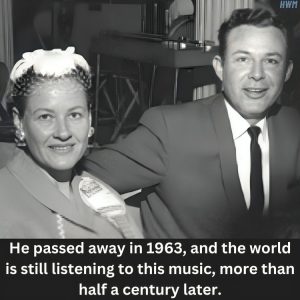In 1960, Jim Reeves released a song that would forever change both country and pop music—“He’ll Have to Go.” With his smooth baritone voice and the song’s lush orchestration, Reeves bridged the gap between genres, leaving an undeniable mark on music history. His voice was pure velvet, effortlessly conveying emotion, while his polished style set him apart from other country artists of the time. The song itself? A masterpiece that not only became a massive hit but also cemented Jim Reeves as one of Nashville’s finest talents.

The Backstory of “He’ll Have to Go”
Jim Reeves wasn’t just any country singer. Known as “Gentleman Jim,” he had a rare ability to blend the sophistication of pop with the raw emotion of country. Born in Texas, he started his career as a radio announcer before fully diving into music. By the time he released “He’ll Have to Go,” he was already a well-established country star, but this song took his career to another level.
What makes the story behind “He’ll Have to Go” even more intriguing is how it came to life. The song was written by Joe and Audrey Allison, inspired by a real-life moment Joe overheard in a bar. A man was on the phone with his lover, pleading with her to get closer to the receiver, desperately trying to win her back. That moment turned into the song’s now-iconic opening line:
“Put your sweet lips a little closer to the phone.”
It’s a simple yet deeply emotional phrase, capturing longing, vulnerability, and heartbreak all at once. This universal feeling resonated with listeners, making the song an instant classic.
A Major Moment for Country Music
When Jim Reeves recorded the song, he didn’t just perform it—he lived it. His delivery was intimate and heartfelt, drawing listeners in with every word. The production, handled by the legendary Chet Atkins, was deliberately minimal. Instead of overwhelming the song with excessive instrumentation, Atkins allowed Jim’s voice to take center stage. The result? A timeless, deeply moving track that listeners couldn’t get enough of.
The song quickly climbed the charts, dominating the Billboard Country Chart and making a significant crossover to the Pop Chart, where it reached #2. This was a major milestone for country music, proving that it could reach mainstream audiences while still holding onto its soul.
But “He’ll Have to Go” wasn’t just a commercial success—it became a cultural touchstone. The song’s themes of heartbreak and longing resonated across generations and backgrounds. Jim’s delivery was the perfect blend of confidence and vulnerability. He didn’t need to overdo it; his voice alone carried the weight of the song’s emotion.
Jim Reeves Becomes a Global Star
Following the song’s success, Jim Reeves became an international sensation. He toured extensively, bringing country music to audiences worldwide. His impact went beyond Nashville—he introduced country music to new listeners who might not have otherwise explored the genre.
His smooth, polished sound played a key role in redefining country music. Until then, country was often seen as raw and unrefined, but Reeves proved it could be sophisticated, emotional, and mainstream. “He’ll Have to Go” wasn’t just a hit—it was a game-changer.
The song helped popularize the “Nashville Sound,” a more polished, orchestral style of country music designed for mainstream appeal. This approach became a blueprint for future artists looking to blend country with other genres.
The Song’s Influence and Legacy
“He’ll Have to Go” didn’t just stop at topping the charts—it inspired countless cover versions by artists across different genres. Some of the most notable covers came from music icons like Elvis Presley and Ry Cooder. While many artists attempted to put their spin on the song, none could quite capture the magic of Jim Reeves’ version. His voice, his delivery, and the song’s heartfelt simplicity made it one of the most memorable recordings of its time.
But perhaps the most powerful aspect of the song is its staying power. Decades later, it remains one of the most beloved country songs ever recorded. It has been featured in movies, TV shows, and commercials, continuously introducing it to new audiences. Its magic lies in its timelessness. The emotions it conveys—love, heartbreak, desperation—are as relevant today as they were in 1960.
Even modern country artists owe a debt to Jim Reeves. Singers like Shania Twain, Taylor Swift, and Keith Urban have successfully blended country with mainstream appeal, a path that Jim helped pave. “He’ll Have to Go” wasn’t just a song; it was a moment in music history that helped shape the future of country music.
The Tragic End of Jim Reeves
Unfortunately, Jim Reeves’ life was tragically cut short. In 1964, at just 40 years old, he died in a plane crash. His sudden passing left a massive void in the music industry, but his legacy lived on through his recordings.
“He’ll Have to Go” remained a staple on jukeboxes and radio stations for years after his death, ensuring that his unmistakable baritone voice was never forgotten. In recognition of his contributions to music, Jim Reeves was posthumously inducted into the Country Music Hall of Fame, solidifying his place as one of the greatest artists in country history.
Even today, his influence is unmistakable. His ability to blend country with pop sensibilities set a standard that modern artists still follow. His smooth, crooning style has become a hallmark of timeless country music.
Why “He’ll Have to Go” Remains a Classic
More than six decades after its release, “He’ll Have to Go” continues to be celebrated as one of country music’s greatest recordings. Its impact is still felt, not just in the genre itself but across the entire music industry.
The song’s beauty lies in its simplicity. It doesn’t rely on flashy production or complex instrumentation—it’s just pure, heartfelt emotion set to an unforgettable melody. It’s the kind of song that never gets old, no matter how many times you hear it.
Jim Reeves proved that country music could be sophisticated, universal, and deeply emotional. “He’ll Have to Go” wasn’t just another hit song; it was a movement. It connected people, transcended genres, and helped define what country music could be.
Jim’s legacy endures, and thanks to this song, his voice still resonates with listeners around the world. If you haven’t yet experienced the magic of “He’ll Have to Go,” now is the perfect time to listen and appreciate one of country music’s greatest masterpieces.





